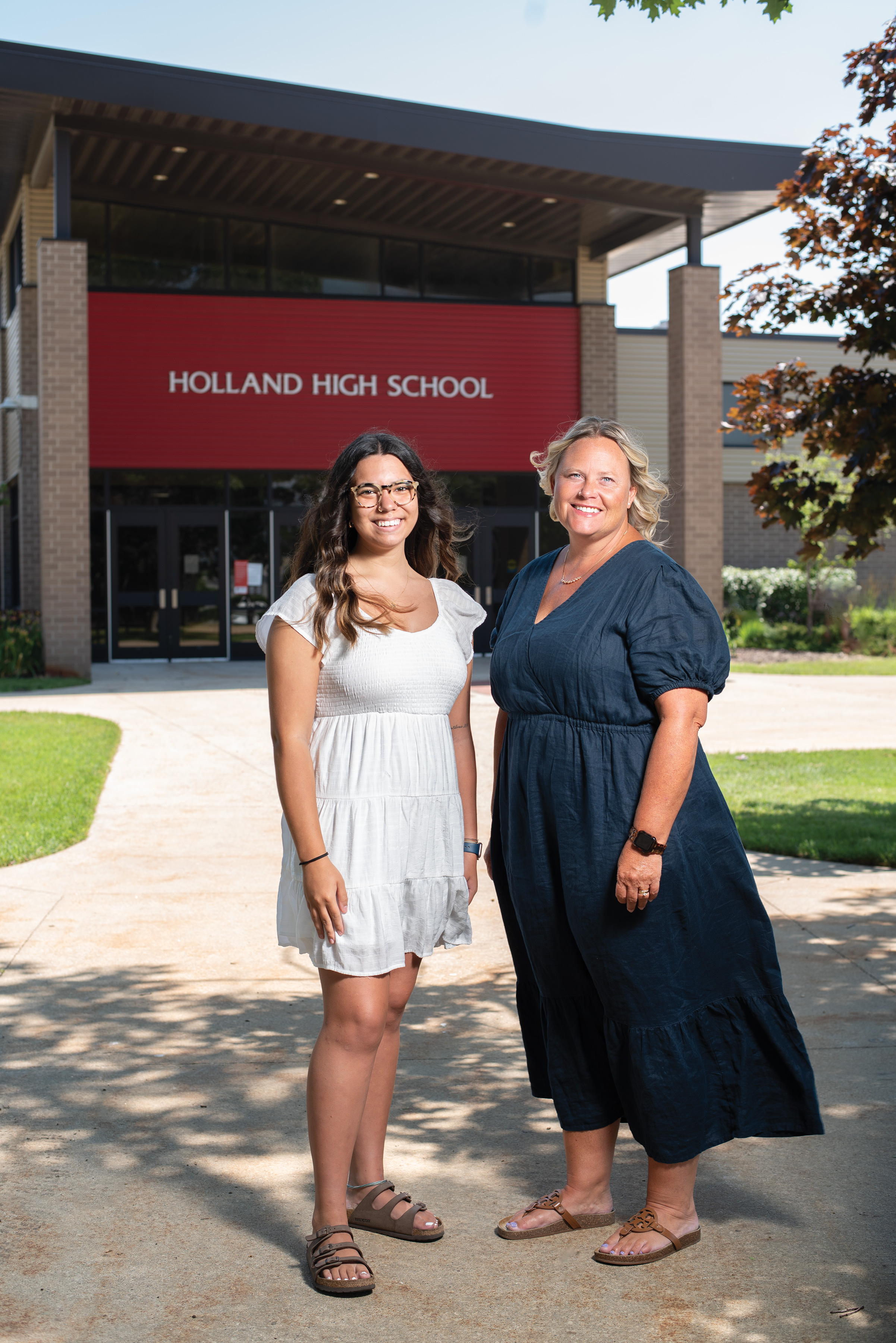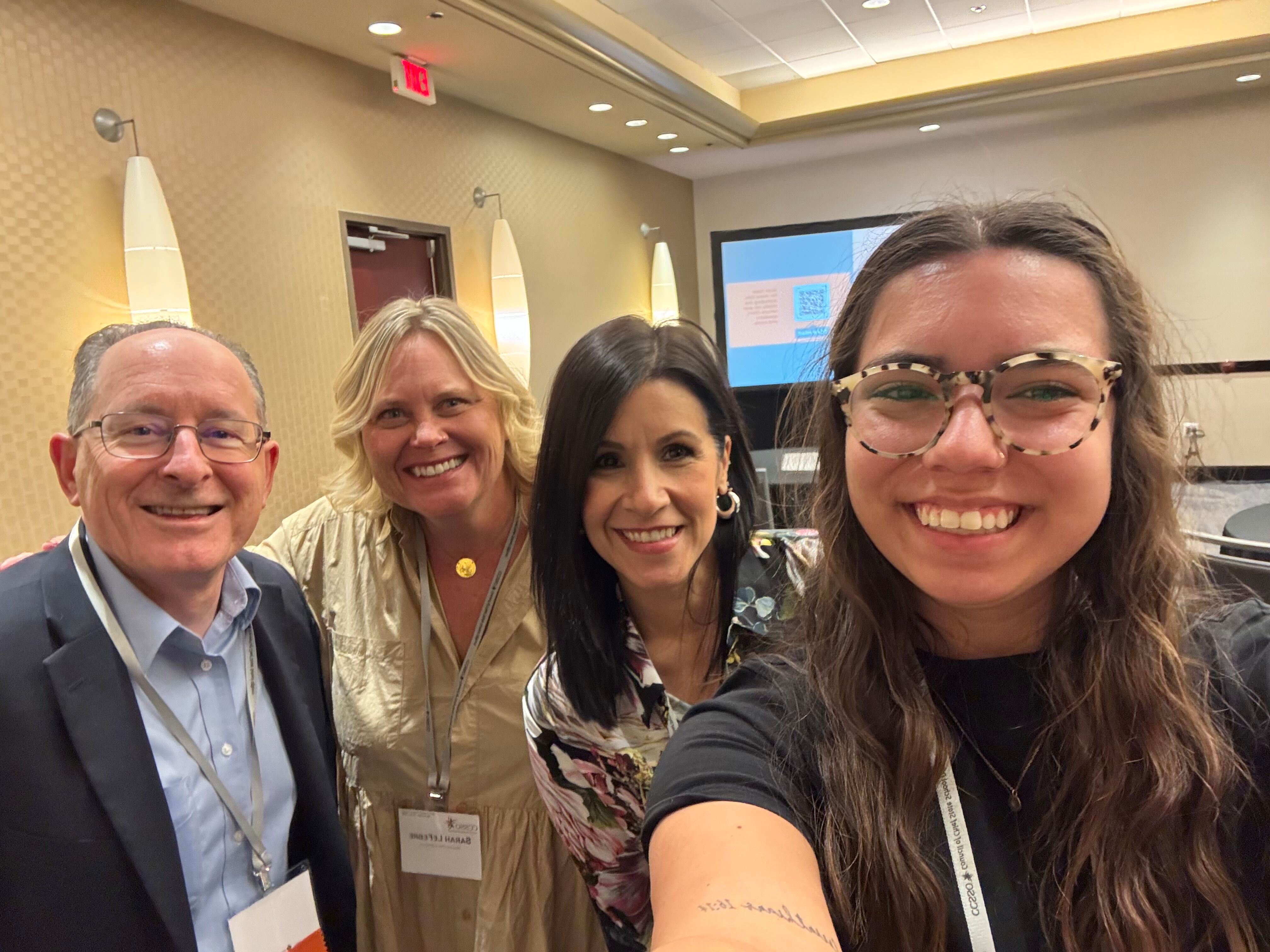‘Doing what’s right for the next generation’: High schoolers explore education careers

By Brenda Ortega
MEA Voice Editor
MEA member Sarah Le Febre realized last spring she didn’t know how many years she’d accumulated in her teaching career or what time counted toward retirement from her early experience as a long-term substitute or years of coaching soccer and cheerleading.
“I had to call the 1-800 number to get into my ORS (Office of Retirement Services) account, and you know what? I will complete 30 years in one year from now. I was genuinely shocked. I mean — I hadn’t really been counting, but long story short: I can retire after next year.”
Le Febre remembers starting out in her career, meeting a few veteran educators who were “grumpy,” and hoping she wouldn’t become that way. She hasn’t.
“The beauty of what I’m doing right now and the love I have for my school district and my students is that I could retire next year, but I won’t.”
She’s busy introducing the next generation of potential educators to the world’s noblest profession. A longtime English teacher at Holland High School (HHS), Le Febre launched a new Future Educator course three years ago with grant funding from the Michigan Department of Education.
The program in Holland is among a wave that has spread across the state since 2020 to grow and diversify the teaching ranks in Michigan. Hundreds of school districts have received $10,000 EXPLORE grants to start up classes and clubs in middle and high schools.
“Teaching this Future Educator course has breathed new life into my career and given me more reasons to love the profession,” Le Febre said.
She recruits students who reflect the diverse demographic makeup of the district. The hope is if they leave to become educators, they’ll return home to become master teachers, she said. “They know us, they love us, and we love them back. We want to nurture that relationship and keep them here.”
Not all of them will choose a career in education. “I think it’s important to note that, because it’s an exploratory program. Kids can go into it and confirm their interest, or they can say, ‘Yeah, teaching’s not for me.’ And either way we’ve done our job.”
Le Febre’s philosophy of teaching the class is to show students parts of the profession that otherwise remain hidden to them. “We pull back the veil so they can see the secrets of the teaching staff, and they love it. They feel so privy and honored, and they handle it very respectfully.”
For example, last year she shared her experience adapting to a strict new school policy on student cell phone use which conflicted with her own classroom philosophy and habits. Early on she wasn’t applying rules as outlined, giving multiple warnings instead of one before confiscating phones.
Then a student who had a phone taken away after numerous warnings complained to administration of inconsistent enforcement and “targeting” by Le Febre, which she said, “was partly true. I was being inconsistent with the rule, but I was not targeting anyone.”
Just that one example led to a rich discussion on topics ranging from the new cell phone policy to relationship building, rules enforcement, and discipline.
“I wanted them to understand how teachers have to navigate school policies in relation to their own philosophies of education, and how students sometimes respond to how we deal with it. There were a lot of things we could unpack in that case.”
From the start, students enjoyed the class and wanted to continue beyond one semester, so a second semester option was added for those who wanted to take Future Educator 2. Both split students’ time between class with Le Febre and placement in an elementary school classroom.
Regular class time is spent covering a wide swath of educational jargon and teaching approaches and debriefing students’ questions and experiences in their placements. Students prepare an extensive capstone project with a goal of delivering a real-world lesson, but that is not required.
“Truth be told, what we offer in this program is very much college-level, and these kids are not in college yet. But all of them by first semester are working with kids one-on-one and in small groups.”
Le Febre related the story of a student from the class who had gotten to know and bonded with an autistic youngster in her placement. One day when a substitute teacher struggled with the child’s behavior, the future educator knew what to do and say to turn around the situation.
“She got on her hands and knees under a table with this child, and she knew what questions to ask about things he enjoyed to get him out of his spiral. The sub was so grateful that a future educator was in the room that day.”

Among many things HHS graduate Liebbe Martinez learned from completing three semesters of the Future Educator class (including an independent study) is that teaching is hard and educators are under-appreciated for the amazing work they do.
“A lot of teachers are very good at masking the hard days and almost putting on a performance so students don’t see it,” Martinez said. “Sarah pulled the curtain back to show us what it’s like to be a teacher — the good, bad, ugly and the very best moments of it, which we really appreciated.”
Le Febre turned difficulties into learning opportunities. “She was always willing to be real and vulnerable with us. Even on bad days, she would be like, ‘You know what? It’s been a hard day, but here we are together and let’s turn it around.’”
Martinez plans to become a special education teacher for students who are deaf and hard of hearing. She just finished her first year of college and will transfer this fall to Baylor University in Texas.
Martinez knew what she wanted to be since her first day of preschool, where the teacher was patient and made learning fun. “The way she ran the class was hands-on and interactive, and that’s what really drew me in.”
Martinez fell in love with American Sign Language from classes in school, and she combined two passions with a Future Educator placement in a classroom for deaf and hard of hearing students.
Since then, she has spent time in summers assisting at a school for deaf children in Jamaica and volunteering at the Deaf and Hard of Hearing Program housed in Holland Public Schools and operated by Ottawa Intermediate School District.
She said she’s drawn to the toughest students displaying the most severe behaviors, although it can be draining, because she likes “getting down on their level” to learn who they are and let them know they’re safe and loved before trying to teach them anything.
“It’s amazing to see them learn and grow and how language and communication can transform their whole lives.”
A year ago, Martinez and Le Febre traveled with HHS Principal Andrea Mehall — at the invitation of Michigan State Superintendent Michael Rice — to speak about the Future Educator program at a national meeting of the Council of Chief State School Officers.
Recently elected to be president of the Holland Education Association, Le Febre said she insisted on Mehall participating on the panel. The principal’s vision and determination brought the class into being, and her continuing support makes it a success.
“I still love what I do, and I’m grateful to share that message with my future educators,” Le Febre said. “If you’re in it because you care about doing what’s right for the next generation, teaching is really wonderful.
“And if you work in a place where your district administration and building administration make you feel like you’re all on the same team, which is exactly what we have here at Holland Public Schools, I don’t know why I would retire. I feel like I could hang in there for a very long time.”
________________________________________________________________________________
SPECIAL REPORT: Teacher Recruitment
- Introduction / MEA welcomes new educators
- ‘Doing what’s right for the next generation’ / High schoolers explore education careers
- Armada: ‘If you love this, do it’
- Lenawee: ‘There are great rewards’
- In para-to-teacher project, classroom aides level up
- Saginaw apprenticeship a first-of-its-kind
- Rural hub at CMU offers free credentials



